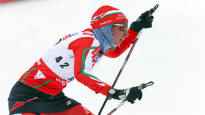Comparing the present and the past is an essential part of racing and following it. In this way, it is possible to outline the development of the species and to consider the reasons for the changes.
Runner Roger Bannister was the first to break four minutes in the mile by running 3:59.4 in Oxford on May 6, 1954. That time would now rank 1,241st in the all-time record.
In 68 years, development has been indisputable in the field of training methods, track materials and shoe technology – without completely ignoring the chemical side.
When Bannister ran his ghost mile, the best cross-country skiers spent an average of three hours on the royal distance, or 50 kilometers. In the 1950s, wooden skis were changing to slats, but progress was made only with the traditional way of skiing and based on intermediate times.
Since then, the progress of skiers has been accelerated by, among other things, the development of equipment and improved ski slopes, as well as the introduction of freestyle skiing and mass departures. The fastest 50 of the world championships was seen in Lahti 2017, when the world champion spent one hour, 46 minutes and 28.6 seconds on the journey.
Throughout the history of skiing, the fastest athlete is Johannes Hösflot Kläbo. The Norwegian is known for his unprecedented ability to change rhythm in skiing, thanks to which Kläbo has dominated mass start races to his heart’s content.
A rare loss
Kläbo and Bannister are connected by the length of the mental distance, from 1,500 meters to Maili, i.e. 1,609 meters.
When Bannister passed away at the age of 88 on March 3, 2018, Kläbo watched the Italian freestyle sprint at the Lahti ski stadium on a special trip. Federico Pellegrino ski racks.
Kläbo had to admit that Pellegrino was better on two other occasions in 2018, but after that there was no winner of the Norwegian star in the freestyle sprint.
Until Saturday came, when Kläbo’s four-year winning streak was broken. And the breaker was another Pellegrino.
Although Kläbo had missed the previous World Cup weekend due to illness, hardly anyone believed in his defeat, especially when Kläbo arrived at the finish line first.
However, Kläbo fell into a rudimentary mistake by leaving the outside lane open, which opened a seam for Pellegrino to overtake without hooking.
Despite this, Kläbo’s kiritapio is a sensation of its own. A similar surprise was experienced in 1999, when Thomas Alsgaard suffered a crushing loss to Austria as Norway’s World Cup relay anchor To Christian Hoffmann.
In Pellegrino’s case, the win came with an early warning. In the morning, the Italian sprint specialist got permission from his wife to go to the race, because the birth of the first child was still waiting for him.
Questionable history
On Saturday, however, skiing history was made in Davos – unfortunately, very questionable.
In the women’s competition, the World Cup points were at a downright ridiculous discount, as there were only 39 names on the participant list.
The international skiing federation FIS changed its rules for this season so that instead of 30, Cup points are distributed to the best 50. Thus, on Saturday, skiing to the finish of the qualification meant a pot of at least 12 points for each skier.
When the Skiing World Cup was established for the season 1981–1982, points were distributed only to the next 15 best so that the winner received 26 points (26-22-19-17-15-13-11-9-7-6-5-4-3-2 -1).
At that time, the World Cup was part of the World Cup. Skiing became the winner of the 50 kilometers of the World Championships Thomas Wassberg, which took two hours and 32 minutes to travel. Norway took the bronze Lars Erik Eriksen lost to the Swede by 49 seconds.
It was a loss less than the Iranian one Samaneh Beyrami Baher and Macedonian Ana Cvetanovska fell short of the winner of the women’s sprint qualifying on Saturday, even though the distance was 33 times shorter than Wassberg and Eriksen’s 40 years ago.
Baher’s exact difference to the top was 55 seconds and Cvetanovska’s 59 seconds. This means that both of them took an average of almost four seconds in each 100-meter section on the 1.5-kilometer course.
Before, every World Cup point was a respectable achievement, let alone double-digit readings. On Saturday, however, Baher was rewarded with 13 points and Cvetanovska with 11 points. That is, because they skied 1.5 kilometers.
Over the years, Iranian and Macedonian skiers have appeared in prestigious competitions, where weaker skiing countries are allowed to send individual athletes to enjoy the joy of participation. There is no need to even mention rankings and differences to the top.
In the eyes of international skiing decision-makers, it may seem great that the sport is getting new countries for World Cup points.
But on Saturday, behind all the glory, it was humiliating in terms of the deep core of the sport, the competition.
